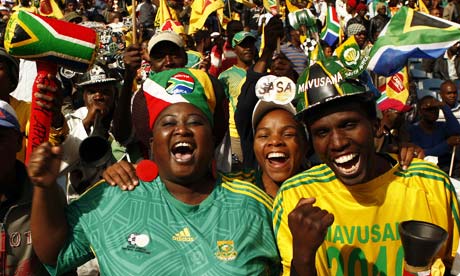 On 19 February President Jacob Zuma took the podium in Parliament to respond to the SONA2015 debate (video). He paused from his prepared speech to address allegations that he is racist and his government seeks to marginalise Afrikaners. This is after the President said, “Jan van Riebeeck’s arrival in Cape Town was the beginning of all South Africa’s problems.”
On 19 February President Jacob Zuma took the podium in Parliament to respond to the SONA2015 debate (video). He paused from his prepared speech to address allegations that he is racist and his government seeks to marginalise Afrikaners. This is after the President said, “Jan van Riebeeck’s arrival in Cape Town was the beginning of all South Africa’s problems.”
Members on the ruling party’s benches cheered and ululated as the President rendered a truncated and tidy version South African history. His magna opus, A Very Short Introduction to South African History, conveniently brushes over the parallel struggles of black minorities against black majorities.
The President did not mention Shaka Zulu’s bloody war of dominance, which erupted from the Natal Highlands and raged across the Orange Free State, Transvaal and as far as the (modern day) Botswana and Zimbabwe. He did not mention the displacement of Ndebeles and Ngonis to Zimbabwe, Zambia and Malawi.
I would ignore Mr Zuma’s version of events if I thought he merely tailored history to suit his narrative of the impact of white settlers in South Africa. But that is simply not the case. It has become commonplace to sterilise South African history into a trilateral conflict between blacks, Afrikaners, and the English.
While Mr Zuma acknowledged that the Khoisan were displaced by settlers, he did not mention their continued marginalisation by the democratic government.
Laurens van der Post chronicles the ghastly treatment of the Khoisan in Botswana in his book The Lost World of the Kalahari. Van der Post’s work focuses on the plight of the Khoisan in Botswana but there are ample examples of marginalization in South Africa. For example, none of the Khoisan indigenous languages such as Khoekhoegowab, Khwedam, !Xu or N/u is recognized as an official language in South Africa.
The UN Special Rapporteur described in a 2005 report the problem of displacement in South Africa, “The most pressing concern of all the Khoi-San communities is securing their land base, and where possible, re-establishing access to natural resources necessary for pastoralism, hunting-gathering or new land-based ventures such as farming.”
The World Conference on Indigenous Peoples heard that Khoisan people are six times more likely to be poor. (Read: The Khoisan In Contemporary South Africa.)
The Khoisan are not the only minority group currently battling suppression by the black majority. Lesbian, gay, bi-sexual, transsexual and intersex (LGBTI) people are also struggling against persecution and marginalisation.
It is fair to say that Mr Zuma’s administration has implemented programmes to protect and promote LGBTI rights. However, that chapter of South African history is far from closed. Even today, there are many reports of incidents violence, murder and so-called “corrective rape”—a hate crime perpetrated against lesbians and suspected lesbians.
The neat version of history also flouts the struggle for social equality and economic emancipation of black women.
Last year ANC Women’s League President Angie Motshekga complained that men in the ANC—the President’s own party—are not willing to relinquish their power to women. She advised women to be tactical in order to “negotiate a way through to get to the tipping point.”
There are more subtle struggles, like the struggle against cultural domination. English, Afrikaans, IsiZulu, IsiXhosa, and Setswana dominate South African popular culture. Other smaller groups, like Tsongas, Ndebeles and Mpondos, are battling for cultural equality. While their struggles are not as sexy as black culture versus white culture, it is a real struggle.
I could not ignore the President’s neat version of history because it does more harm than good. The “us and them” narrative of history—where us are black and them are white—is counterproductive. It fragments our society. More importantly, by collectivising black victimhood, it overlooks the continuing struggles of black minorities and other marginalised groups.
The depth and breadth of South African history is important. It forms the foundation on which we must unify and build the nation.
By Brad Cibane




























